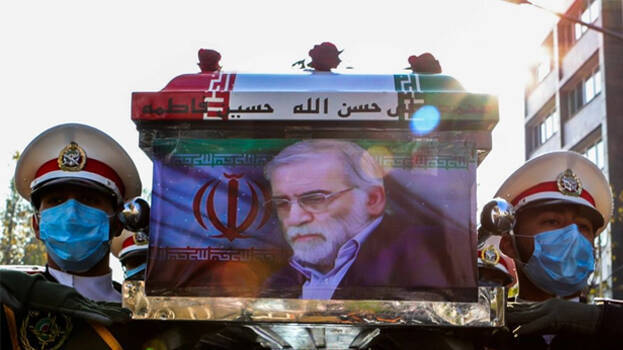

TEHRAN: Iran's top nuclear scientist Mohsen Fakhrizadeh was killed by Israeli assassins using a remote-controlled machine gun left inside a car which then blew up, sources within Tehran have claimed.
Fakhrizadeh was shot at least three times by the gun, positioned in a Nissan pickup that was parked alongside the road he was travelling on before it blew up, the semi-official Fars News Agency reported.
The details emerged as Iran held a funeral for the slain scientist, known as the father of the country's nuclear programme, in Tehran on Monday - where leaders continued to vow revenge for his killing.
On Sunday, a hardline Iranian newspaper run by one of the Ayatollah's advisers, called for the Israeli port city of Haifa to be attacked in retaliation - in such a way as to guarantee 'heavy human casualties'.
Senior figures within the Iranian leadership hold Israel responsible for killing Fakhrizadeh. Israel has not acknowledged the killing.
Iran's top security official, Rear-Admiral Ali Shamkhani of the Supreme National Security Council, said the "operation was very complex, using electronic equipment and no one was present at the scene".
He said that Iranian resistance group the People's Mujahedeen of Iran (MEK) were "certainly" involved, along with "the Zionist regime and the Mossad".
The description of the remote-control assassination contradict previous reports in the Iranian press that claimed the Nissan pickup exploded first, before a team of human assassins descended on the convoy, hauled Fakhrizadeh out of his car, and shot him in the street.
Revealing more about the new account of how Fakhrizadeh, sources told Fars that he had been travelling in a bulletproof car with his wife north of Tehran when something hit the car, causing the convoy it was travelling in to stop.
Fakhrizadeh then got out of the car to check what was happening before the remote-controlled gun opened fire, Fars said. The nuclear scientist was shot twice in the side and once in the spine, killing him.
A bodyguard who tried to shield Fakhrizadeh's body was also shot and wounded before the parked car exploded.
'In this operation, which lasted about three minutes, no human agents were present at the scene of the assassination, and the shootings were carried out only with automated weapons,' a source was quoted as saying.
Investigators also claimed to have identified the owner of the Nissan, who they said left the country on Sunday, two days after the attack took place.
Ali Shamkhani, the secretary of the country's Supreme National Security Council, repeated the line during Fakhrizadeh's funeral, saying that 'electronic devices' were used in the attack.
State TV's Arabic-language channel, Al-Alam, also claimed the weapons were 'controlled by satellite' and added that weapons found at the scene had been identified as 'made in Israel'.
Iran has been caught in a quandary over how to respond to the assassination, with some urging immediate action while others - including President Hassan Rouhnai - urged patience.
Iran is thought to fear that any tit-for-tat attack could force incoming President Joe Biden to backtrack on a pledge to renegotiate a nuclear deal with the country that Trump tore up.
For Iran, the deal would mean the lifting of sanctions which have crippled the country's economy and led to domestic unrest.
Supreme Leader Ayatollah Ali Khamenei has vowed 'definitive punishment of the perpetrators and those who ordered [the attack]' without saying who he believes is responsible.
During the funeral, Defence Minister Hatami added: 'The enemy knows very well that no crime will go unanswered by the Iranian nation, and we will definitely pursue the criminals, and the command of the Supreme Leader will be carried out.
'We are facing an enemy who for 40 years said that the military option is on the table, but did not dare use it and shamefully carried out this attack under the table.